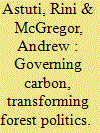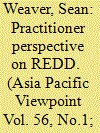|
|
|
Sort Order |
|
|
|
Items / Page
|
|
|
|
|
|
|
| Srl | Item |
| 1 |
ID:
138255


|
|
|
|
|
| Summary/Abstract |
The Reducing Emissions from Deforestation and Forest Degradation Plus (REDD+) programme seeks to reshape the way we value, govern and interact with forests. Rather than managing forests according to interests in timber, conservation, land or livelihoods, REDD+ encourages forms of forest management that prioritise carbon. While international negotiations are shaping the rules of the programme, how it takes place on the ground will depend on its interpretation and implementation in different places. In this paper, we are interested in how the REDD+ Task Force (Satgas REDD+), an ad hoc body formed by presidential decree to design and implement REDD+ readiness activities in Indonesia, has attempted to mainstream the programme from 2010 to 2013. We develop a governmentality approach to focus on how the Task Force sought to introduce REDD+ carbon rationalities to forest politics. Based on extended ethnographic research, we identify three strategies: adopting and promoting the carbon discourses circulating among global REDD+ communities; making carbon visible and governable through mapping technologies; and implementing participatory technologies to encourage pro-REDD+ subjectivities. In some ways, the Task Force has been successful in building awareness about forest carbon among forest stakeholders in Indonesia. National civil society organisations, in particular, appear to be supportive of REDD+; however, they emphasise ‘co-benefits’ framed as ‘Beyond Carbon’, informed by social and environmental justice. For others, however, forests remain sources of timber and land, and new strategies are required if REDD+ is to have substantial impacts on forest governance in Indonesia. The Task Force's efforts reveal the difficult and contested processes through which global climate change programmes come to be embedded in national arenas.
|
|
|
|
|
|
|
|
|
|
|
|
|
|
|
|
| 2 |
ID:
138263


|
|
|
|
|
| Summary/Abstract |
This paper presents a practitioner perspective on community-based REDD (Reducing Emissions from Deforestation and forest Degradation) projects in the Pacific Islands. It draws upon the author's experience in forest conservation financing since 1987, and REDD project and programme design, development and implementation since 2006. The aim is to highlight the commercial challenges faced by REDD practitioners, and explore strategic (including policy) solutions to meet these challenges. The paper begins by situating REDD as a tool for forest conservation and community development. Following a brief overview of the key elements of REDD project development procedures, the paper examines commercial (particularly market access) challenges faced by project proponents, together with challenges associated with the supply and demand dynamic for REDD credits in the global carbon market. This is situated against a backdrop of global policy stagnation in the REDD sector and the implications of this for those at the frontier of community-based forest protection efforts on the ground. The paper culminates by showing the importance of an effective partnership between governments, rainforest communities and the private sector in regional and global rainforest conservation financing.
|
|
|
|
|
|
|
|
|
|
|
|
|
|
|
|
|
|
|
|
|